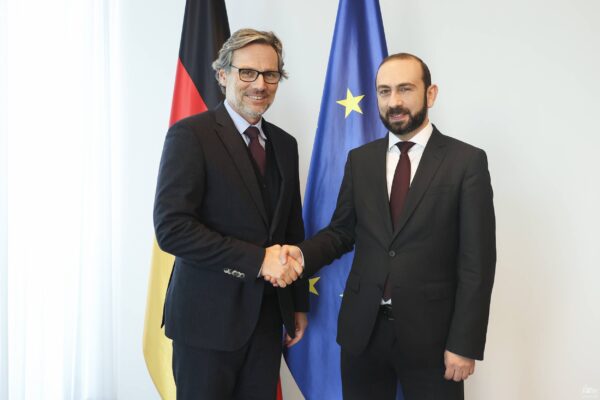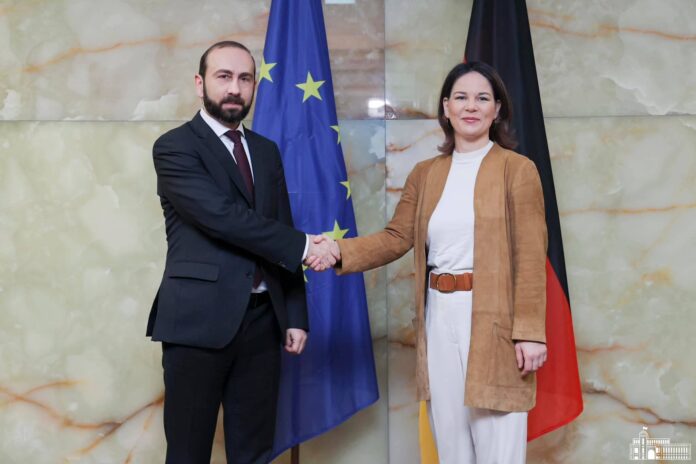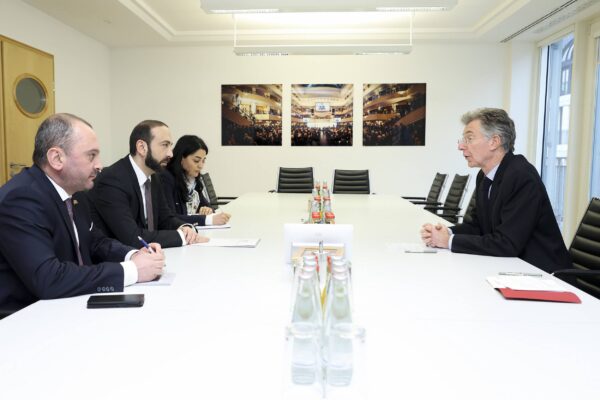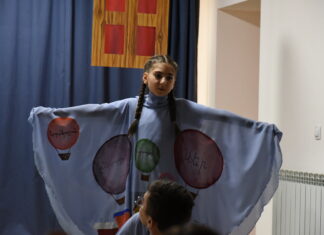BERLIN — If the growing crisis in Nagorno-Karabakh has finally landed on the political agenda in Berlin, it has a lot to do with the working visit of Armenian Foreign Minister Ararat Mirzoyan to the German capital last week. In two packed days, he met with the people and institutions that could make a significant contribution: his German counterpart Foreign Minister Annalena Baerbock, Chancellor Scholz’s foreign and security policy advisor, senior members of parliamentary committees, the head of the Munich Security Conference, as well as representatives of German experts and think-tanks. In all venues, his primary focus was on the need for action by Germany and the European Union to lift Azerbaijan’s blockade of the Lachin corridor. In remarks delivered during a joint press conference on February 7, Baerbock finally demanded the blockade be ended and outlined concrete commitments to actions aimed at achieving security and durable peace in the region.
On the first day of his two-day visit, the Armenian foreign minister met Christoph Heusgen, Chairman of the Munich Security Conference. This, the largest and most important international security conference, has been meeting every year in the Bavarian capital since 1963. This year’s gathering, which takes place February 17-19, will see the biggest delegation ever from the US, with a third of the Senate, as well as 45 heads of government and state, and hundreds of ministers. Mizoyan briefed Heusgen on the humanitarian crisis created by the Lachin corridor blockade, stressing Azerbaijan’s ethnic cleansing policy against Armenians and calling for international efforts to prevent it. The two discussed cooperation, including in the context of the Munich Security Conference, which hopefully means the Nagorno-Karabakh crisis will be on the agenda.
On February 7, a large group of the senior members of key Bundestag (parliamentary) committees convened for a discussion with their Armenian guest. These included committees on foreign affairs, defense, human rights and humanitarian aid, and EU issues. Present at the meeting were members of the Germany-South Caucasus Friendship group, whose chairman, Dr. Johann Wadephul, received Mirzoyan before the gathering.
The German-Armenian Forum, which co-organized the event, is a caucus of parliamentarians, civil society representatives, academics, diplomats, and others, which promotes political, economic, and cultural relations between the two countries. In his welcoming remarks, its president, FDP parliamentarian Till Mansmann, said Germany “supports the EU’s stabilization efforts for stability and peace in the region,” adding that the most important task is opening the Lachin corridor. Mirzoyan underlined the importance of this ongoing inter-parliamentary cooperation, for its contribution to enhancing the bilateral agenda and deliberation on regional issues. Their discussion covered progress in Armenia’s reform agenda, which has enjoyed the support of Germany and the EU. Mirzoyan, who briefed participants on the ongoing humanitarian crisis, expressed his appreciation for their commitment to unblocking the corridor and reinstating free movement. He also brought them up to date on the Armenian-Azerbaijani peace process, which, he said, was being undermined by Baku’s warmongering rhetoric, maximalist ambitions, and aggressive stance.
The same issues dominated the exchange between the Armenian Foreign Minister and Jens Plötner, Chancellor Olaf Scholz’s Foreign and Security Policy Advisor, when they met on February 7. The emphasis was on the need to lift the Lachin corridor blockade immediately to address the humanitarian crisis. Both stressed the importance of further deepening bilateral ties as well as the EU-Armenia partnership. The most important development in this connection is the recent decision by the EU to send a long-term monitoring mission to the region, along the border of Armenia and Azerbaijan.

Concrete Steps by Germany, EU









